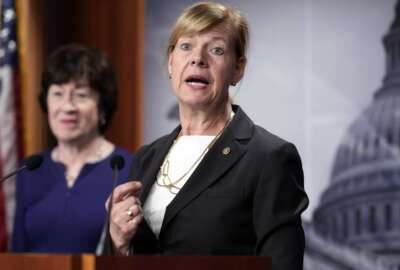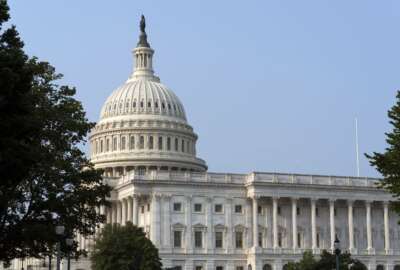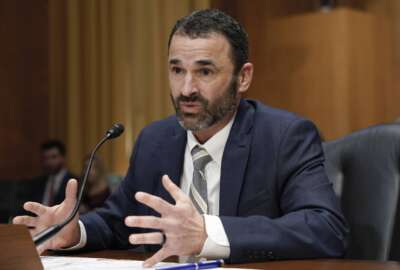Hubbard Radio Washington DC, LLC. All rights reserved. This website is not intended for users located within the European Economic Area.
Rep. Connolly says momentum is building for IT procurement reforms
Sen. Jean Shaheen (D-N.H.) introduced an amendment to the upper chamber's version of the Defense Authorization Act that closely mirrors the House's Federal IT A...
wfedstaff | April 17, 2015 5:52 pm
The widespread management and oversight failings of the HealthCare.gov rollout renewed the call on Capitol Hill and from the White House to fix how agencies buy technology.
While the administration continues to focus on fixing the Affordable Care Act portal by Nov. 30, the Senate is poised next week to follow the House’s lead and act to reform the way agencies buy technology.
But one of the co-authors of the Federal IT Acquisition Reform Act (FITARA), Rep. Gerry Connolly (D-Va.), said the bill is by no means the silver bullet or panacea to the systemic problems HealthCare.gov once again exposed.
“Getting FITARA into law is a real first step. It’s not going to solve all the problems,” Connolly said in an interview with Federal News Radio. “But I think it’s going to create a new environment for IT management that we badly need.”
The House passed FITARA in June as part of the 2014 National Defense Authorization Act (NDAA).
The Senate finally acted on the bill Nov. 20 when Sen. Jean Shaheen (D-N.H.) introduced an amendment to the upper chamber’s version of the NDAA.
“The problems with the Affordable Care Act website highlight the need for a larger effort to upgrade our informational technology infrastructure,” said Shaheen in a release. “What we’re doing right now is outdated, expensive and inefficient. We have to upgrade the way we do business, boost accountability and oversight, and put in place the right kind of federal IT infrastructure for the future, and we have to do it now.”
Shaheen said her amendment mirrors the House version of FITARA, except for the data center consolidation provisions. Sens. Tom Carper (D-Del.), Tom Coburn (R- Okla.), Kelly Ayotte (R-N.H.) and Michael Bennet (D-Colo.) introduced a separate amendment to the NDAA to address agency requirements to consolidate data centers.
The committee passed the Data Center Consolidation Act in November.
Support for reforms grow
Carper and Coburn, the chairman and ranking member, respectively, of the Homeland Security and Governmental Affairs Committee, held several hearings looking at different aspects of FITARA, such as giving agency chief information officers more authority, but never introduced a companion bill.
“Chairman Carper and his staff continue to work with Senate and House colleagues to improve how our federal agencies manage their IT systems,” said a committee staff member by email. “Earlier this month, the committee approved S.1611, the Federal Data Center Consolidation Act of 2013, which mirrors a major provision in Chairman Issa’s FITARA legislation. Advancing this measure is a priority of Chairman Carper.”
Connolly said the Senate is close to acting on FITARA, as support grew considerably after the HealthCare.gov debacle.
He said his and Issa’s staffs have had good conversations with Carper and Coburn’s staff, as well as those of several other senators.
“I’m really hopeful especially, frankly, after the health care website difficulties that people are now seized with the mission that we must do a better job of federal IT acquisition,” Connolly said. “Of course, I wish one could say the health care roll out was unique, but it, frankly, characterizes large federal IT procurements.”
As for the administration, President Barack Obama earlier this month called for a review of the federal procurement processes to buy IT.
But the White House has not signaled what the review would entail or what steps need to be taken.
Tries to fix systemic problems
FITARA is considered the first major rewrite of the Clinger-Cohen Act of 1996 and the first major governmentwide technology and acquisition change in the law since the E-Government Act of 2002.
Both bills attempted to improve agency management and oversight of IT. But many experts believe agencies fell well short of implementing key provisions of the bill, and Congress dropped the oversight ball.
FITARA would reduce the number of CIOs from more than 200 across the 24 major agencies to requiring only one person with the title of CIO per department.
It also gives the CIO more authority and accountability, and requires each CIO to be presidentially-appointed, but not Senate confirmed.
Additionally, the legislation aims to help agencies in developing requirements for IT programs. It would create a Federal Infrastructure and Common Application Collaboration Center, which would serve as a focal point for the program and technical expertise necessary for coordinated IT acquisition best practices. The bill’s authors task the center to lead the review of significant or troubled IT investments or acquisitions on the IT Dashboard and provide expert aid when needed.
Connolly said these two provisions, in many respects, epitomize the problems with HealthCare.gov — a lack of accountability and poor requirements development.
“For one thing, I’m not sure if it’s clear that there was somebody in the federal government that was in charge. There was no project director. That was astounding. What could go wrong with that?” he asked sarcastically. “So you had sort of a stovepipped approach even with the private contractors that didn’t bring this all together as a piece. You didn’t have consistent testing to make sure the roll out would be problem-free or mostly problem-free. Warning signs about technical glitches in advance of the roll out were either ignored or dismissed. So as a result, we had what we had. It’s a real management failure. But I do think it’s a great ‘Exhibit A’ for why FITARA might have made a difference and might have at least encouraged a different kind of management mentality about this very important roll out for one of the most transformative pieces of legislation in the last generation.”
Connolly added the CIOs need authority, but there also has to be consistency among project and program managers.
When he worked for a government contractor, he said there was one project that had 17 different federal executives in charge over the three year program.
“We do need to make sure program directors and contract project directors have some real authority. We also have to make sure they have real continuity, whether it’s the CIO that manages that or the agency head. What we do need is to make sure people can stay with a long-term IT investment program for either the life of the program or a good chunk of it,” he said. “Constant turnover is very disruptive and means that you creep that program with other expectations that may or not be formally written in the original request for proposals.”
Silent all these months
FITARA would help promote a formal career path for project and program managers by requiring agencies to develop five-year strategic workforce plans that focus on training and development of these employees.
Despite the newfound support from the Senate for FITARA, the White House has yet to show its support.
Connolly said while federal CIO Steve VanRoekel has warmed up to the bill, the Office of Management and Budget more broadly hasn’t discussed it with the House much at all.
“Much of FITARA, frankly, codifies many of the reforms both Steve VanRoekel and his predecessor [Vivek Kundra] advocated for in the early years of the administration,” he said. “This is not an adversarial bill at all, and as I’ve told him both publicly and privately, ‘You’re not going to get a friendlier bill in Congress than this one.’ If I were them, I’d take it and run. OMB is always a problem. They would rather not have Congress mucking around in anything the executive branch does, and they seem to have told us one thing and told the Senate something else. We are trying to straighten that out. I think OMB has to speak with one tongue and quite clearly about if it has concerns identify them and if you don’t, get out of the way.”
Connolly said OMB has not laid out any concerns to him other than “vague legislative interference with the prerogative of the executive branch.”
Instead, he said OMB says everything is fine and they don’t need any more legislation.
“That line may have worked prior to the roll out of the health care website, but that doesn’t pass the giggle test with the public or members of Congress today,” Connolly said. “I have had good conversations with Steve VanRoekel. I have not had any kind of reaction from OMB itself whether they like or don’t like the legislation, and, if they don’t, what is it that bothers you that we possibly could address? They certainly were invited along with other federal agencies to participate in the drafting process.”
Connolly said OMB has let senators know more about its concerns with FITARA.
“That is not playing straight with members of Congress,” he said. “This is an important piece of legislation, and I’m not about to have it damaged in the dark of night by a stiletto.”
A request to OMB for comments on FITARA and Connolly’s criticisms was not returned.
RELATED STORIES:
House approves IT reform amendment to Defense bill
Feasibility of DATA Act questioned even as Senate committee OKs it
Rep. Issa heading down familiar path for IT reform; Senate still in discovery mode
HealthCare.gov problems rekindle push for IT procurement reform
Inside the Reporter’s Notebook: Communication breakdown over FITARA? Lawmaker wants answers from DHS
Copyright © 2024 Federal News Network. All rights reserved. This website is not intended for users located within the European Economic Area.
Jason Miller
Jason Miller is executive editor of Federal News Network and directs news coverage on the people, policy and programs of the federal government.
Follow @jmillerWFED





